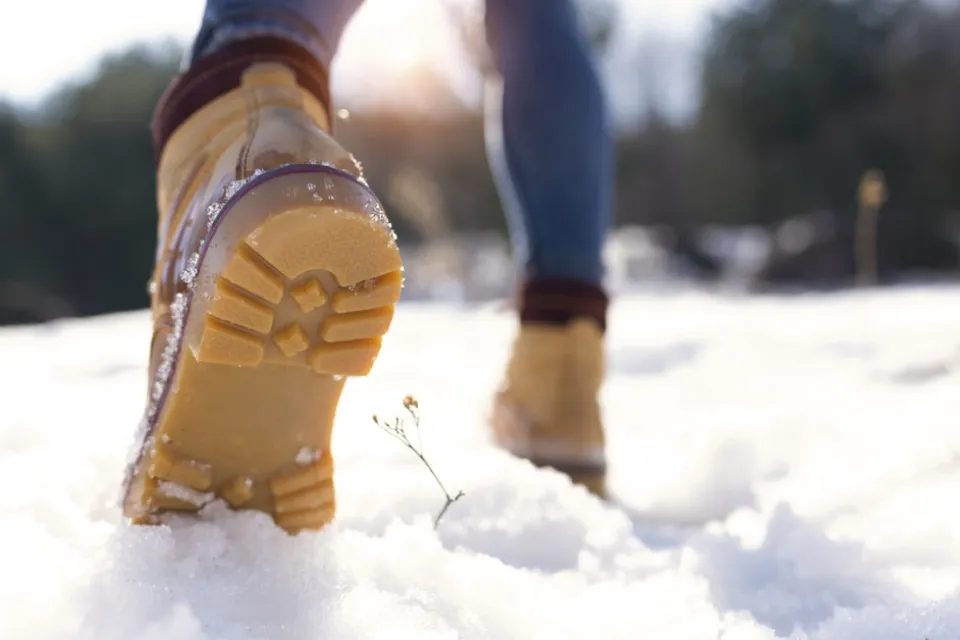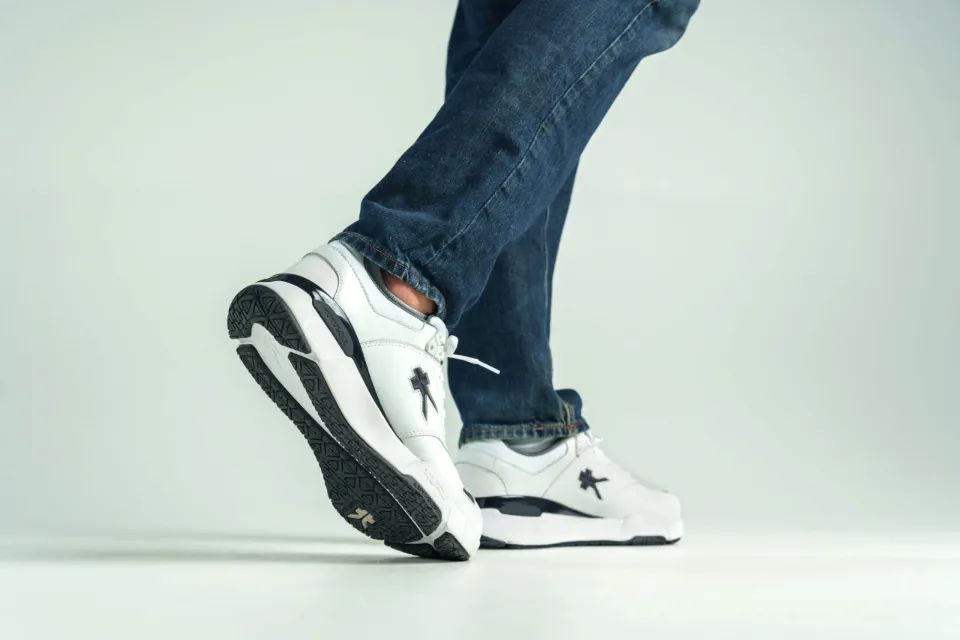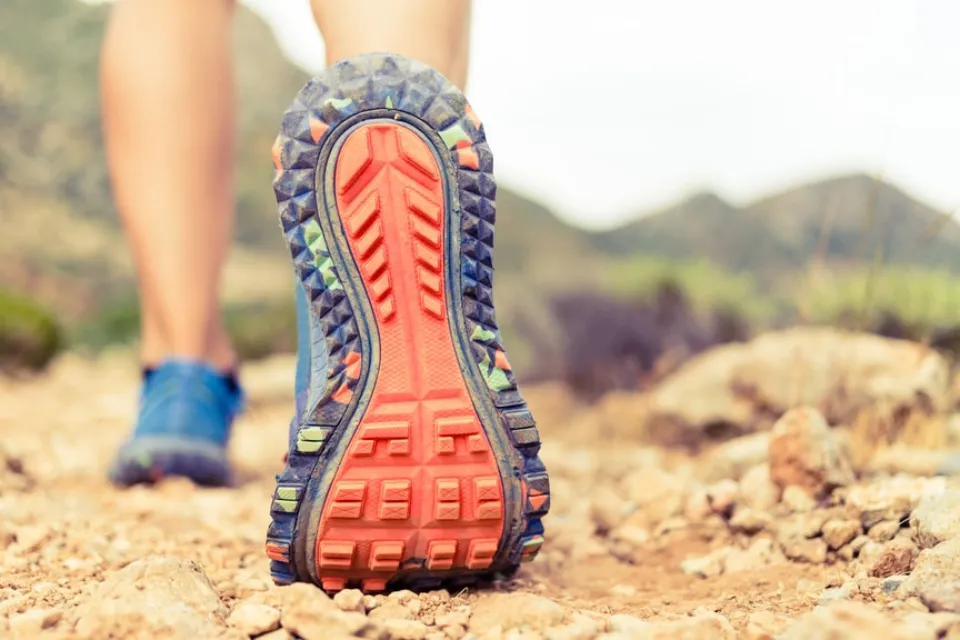Wondering what are non slip shoes? Non-slip shoes are specially designed footwear that provide enhanced traction and grip to prevent slipping on various surfaces, especially those that are wet, oily, or slippery.
Here’s everything you should know when choosing a pair of shoes and how to tell if they are non-slip, whether you’re starting a new job or are just thinking about your safety.
What Are Slip-Resistant Shoes?
Unlike the typical shoe design, slip-resistant or non-slip shoes are specifically designed to reduce slips, trips, and accidental falls.
Their outsoles have grippy treads, keeping you stable on your feet while walking on wet and slippery terrains.
Do shoes with traction soles actually work? You bet! With non-slip footwear, you can confidently navigate challenging, slick surfaces like oily kitchen floors or icy sidewalks, knowing that the specialized traction patterns will help prevent unfortunate everyday life and workplace accidents and keep your feet safe.
They can now be found in a variety of styles to suit everyone’s tastes!
Key Features of Non-Slip Shoes
How do regular and non-slip shoes differ from one another? Non-slippery footwear differs from other styles of footwear in a number of ways, including the pattern, materials, and design of the sole.
Materials
When they make contact with the ground, materials used to make shoes come into play. The best non-slip work shoes are usually softer on the outside, while their outsoles are typically made of high-grade rubber and sometimes synthetic rubber.
They have slip-resistant rubber soles, enabling a firm grip on oily, slick, and slippery surfaces.
Design of Sole
The shoe’s design also affects how slip-resistant it is in addition to its soles. Slip-resistant work shoes have a unique design that allows them to provide a reliable grip in a variety of styles.

Pattern
In order to prevent slipping under various conditions, the proper pattern in the outsole creates traction and gives the wearer a firmer grip. What kind of sole is non-slip? Most non-slippery shoe soles have a bumpy surface – interlocked tread patterns ingrained under the outsole.
No room is left for the liquid inside the outsole thanks to a special enclosed tread pattern. Instead, it directs liquid away from the shoe and, thanks to its rough surface, keeps your foot secure in any position.
What Are the Benefits of Non Slip Shoes?
While they might not be the best footwear to moonwalk down the hallways of your office, non slipwork shoes offer a host of benefits—both to employers and employees:
- Safety: Accidents can occur in a split second and may cause severe injuries or require time away from work. Slip-resistant footwear has the potential to significantly reduce the risk of accidents at work.
- Productivity: A person can work more quickly if they are wearing slip-resistant shoes. You are no longer required to move carefully through crowded kitchens or hospital hallways. Instead, you can confidently get through a shift.
- Comfort: A supportive sole is a requirement for any non-slip shoe worth purchasing. Most will have an ergonomic design to lessen stress and offer relief from being on your feet all day. If you experience foot pain or issues, safety footwear that is supportive and comfortable may be your solution to preventing foot pain at work.
How to Tell If Shoes Are Non Slip?

Whether shopping in-person or online, it’s good to know what to look for before buying a pair of slip resistant shoes. Here are a few tips on how to tell if shoes are non slip:
Check the Box Or Product Description
Frequently, a shoe’s slip resistance will be noted on the box. Read the product description thoroughly before purchasing anything online.
A reliable pair of running shoes or a rubber clog may provide comfort for many office workers. But keep in mind that these alternatives might not provide as much protection on wet surfaces as a slip-resistant shoe.
Examine the Shoe Sole
Always check the shoe and its sole, regardless of the box or product description.
Does it have grooves that redirect trapped liquid from below the sole? Does it have tread that provides optimal slip resistance? Is it made from slightly softer and more flexible material to increase traction?
You’re already moving in the right direction if you can check off all of these boxes.
Try Them on
What are they feeling, you might wonder? Can the toes move around freely? Consider trying on the shoes and observing how they grip the various surfaces.
Read the reviews and the exchange or return policy before making an online purchase. You can choose the perfect shoe for you by carefully examining images of the outsole.
Read More:
Who Should Wear Non-Slip Shoes?
- Health Care Workers — Employees in the healthcare sector frequently rush from one task to another while standing on hard floors that are prone to slipping. Healthcare workers should wear non-slip work shoes because they are comfortable all day long and easy to clean.
- Restaurant Workers — The majority of restaurants mandate that staff members put on non-slip shoes because they frequently deal with spills and slick surfaces. Workers who handle food or cookware are particularly subject to this requirement.
- Warehouse Workers — Falling and slipping is a common safety risk in a warehouse environment. Many warehouses have a policy requiring employees to wear non-slip, premium warehouse shoes that provide additional foot protection in order to help prevent these accidents.
- Delivery Drivers — All day long, delivery people and postal workers handle bulky packages on various surfaces while getting in and out of their cars. They have the stability they need to perform their job duties effectively when wearing slip-resistant work shoes.
- Cleaning Service Workers — Employees in the cleaning industry should put on slip-resistant footwear to increase traction and prevent falls while mopping and polishing floors or working in wet environments.
- Factory Workers — If the proper precautions aren’t taken, factories are home to many safety hazards. Factory workers can benefit from donning non-slip footwear throughout their shifts in case of spills or floor cleaning.
- Contractors — Contractors and construction workers walk on numerous surfaces that are vulnerable to oil or water spills. Contractors and construction workers are kept safer while working when they are wearing protective footwear with non-slip tread.
- Hair Stylists and Barbers — Barbers and hair stylists use a lot of chemicals and are required to maintain high standards of hygiene. A nasty fall may result from cleaning up spilled material on the floor or from cleaning up a dirty area. Some of the best shoes for people working in the beauty industry are slip-resistant ones that are comfortable for standing all day.
Conclusion: What Are Non Slip Shoes
In conclusion, a slip-resistant shoe should have a high-quality, rubber-like outsole with deep grooves that grips well on wet or oily surfaces.
You can feel secure all day long without slipping and sliding thanks to the tread’s grooves’ ability to grip the ground without trapping a wet substance beneath it.
FAQs About Non Slip Shoes
Are Running Shoes Non Slip?
They are not always made with an anti-slip design.
Is Slip-resistant the Same as Non Slip?
Non-slip shoes are also known as slip-resistant shoes.
Are Tennis Shoes Non Slip?
Tennis shoes are generally non-slip.



